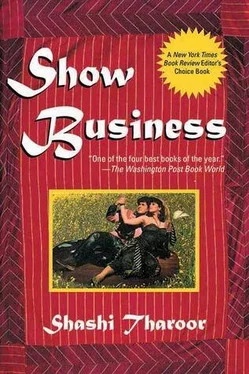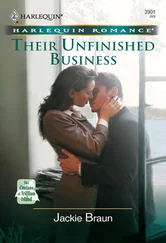The ragpicker cowers and points helplessly to the broken wheel.
“Sahib,” he says anachronistically, for the usage was to be a legacy of colonialism, “my wheel is broken.”
“That’s not my problem,” the man in the chariot snaps. “Get your cart off the road.”
“Sahib, I ca- … cannot. The wheel will have to be repaired first.”
“Do you expect me to wait, imbecile? Push it out of my way.” This time the whip comes down on the ragpicker’s shoulders.
“Ye-e-s, sahib.” The ragpicker tries to lift the collapsed end of his cart, but it is too much for hirn. Sweat breaks out in beads on his face, he grunts with the strain, but the cart will not budge. He goes to the front and tries to coax his buffalo to move. It does not. He prods the animal with a stick. The buffalo starts up, but the cart only creaks and collapses further, one corner now touching the dusty ground.
“Sahib … you see—”
The man in the chariot leaps down, red eyes blazing, and hits the ragpicker with his whip. His victim raises his arms across his face in a gesture of self-protection and abasement, but still the blows rain down. Hearing the disturbance, four men, clad in simpler versions of the whip-wielder’s costume, and with copper bracelets rather than gold, run in. A command is barked: the four push aside the ragpicker, seize his cart and bodily turn it over, and send the cart and its contents crashing and splintering against the wall. The buffalo, lowing, falls; the ragpicker’s worldly goods lie shattered and scattered at his feet; one of the four men cuffs him soundly for good measure as he sprawls on the ground. But the way is now free for the chariot.
An old blind woman with flowing white hair bends down to take the ragpicker’s head in her hands. “What have they done to you, my son?” she asks, sightless eyes staring into the camera.
He says nothing. She looks into a distance beyond the vision of the seeing and says in a terrible voice, “It will all be over soon, my son. Justice will come to this world. This evil will be destroyed.”
The ragpicker utters a disbelieving sound, half moan, half laugh. “How, Ma? Who will do it?”
“Don’t worry,” she replies in the same tone. “He will come.”
“Who, Ma?”
She does not need to answer, for the sound track thunders and flaming titles fill the screen like flashes of lightning:
ASHOK BANJARA
as
K A L K I
As the credits continue, the theme song is heard, sung by a chorus of voices bhajan-style to the accompaniment of a wheezing harmonium and clashing castanets:
In the darkness of the world
dharma’s banner is unfurled
as the evil and the sickness must be fought;
when all good is crushed and curled
and insults to God are hurled,
it’s time for action to take the place of thought.
Kalki! Kalki!
arise, o lord, your noble time has come; Kalki! Kalki!
descend to earth and strike adharma dumb.
The poor can eat no rice,
the rich indulge in every vice,
the awful time of Kaliyug is here;
men are trampled just like mice
as oppression claims its price,
but now the time for deliverance is near.
Kalki! Kalki!
Hope dawns at last upon your glorious birth! Kalki! Kalki!
Our salvation comes when you destroy the earth.
[“Now wait a minute/” the superstar said to the producer. “I thought Kaliyug was now. J thought Kalki was yet to come, that Kalki would come at the end of our modern era to destroy the present-day world, which has lapsed into immorality, et cetera, et cetera. Why then have you conceived this as a costume drama, set in the age of chariots and palanquins?”
[And the producer replied, “Mythologicals in modern dress? What you are saying? You are wanting me to lose all my money or what? No, my dear Thiru Banjara, when the Indian public is coming to see mythological, it is coming to see chariot, and palanquin, and costumes with much gold. How it matters what time story is being set? When our noble ancestors were thinking of Kaliyug, were they imagining motorcars and suit-pant, if you please? And kindly be thinking also of something else. If this filmistory taking place today, without palanquins and all, in independent India, and Kalki is to come down to destroy that, how will be reacting our friends the censors? You think they will be liking? You think they will be saying, ’Please show wickedness of our politicians, and police, and corruption and all, we will give U certificate and recommend entertainment-tax exemption’? No, my friend, they will be going cut-cut with scissors, they will be banning on grounds of likely to incite disaffection and public disturbance. And then where I will be? And not to forget: where you will be?”
[ “You’re right, Murthy-ji,” said the superstar. “Forget I ever asked.”] Vignettes of Kaliyug, when the moral order of the world is turned upside down: in a luxurious palace rules an evil queen, with a hooked nose and white-streaked hair, seated on a throne of burnished gold. She is surrounded by courtiers with ingratiating smiles who bend deeply from their copious waists. A young man is dragged into her audience hall and flung at her feet. “He is from the stables,” says an oily courtier. “He wants more. He has been saying that the horses eat better than the stablehands.”
“Take him away and flog him,” says the queen. “Then send him away. We can hire two new stablehands on the wages this ungrateful men is being paid.” The man shouts his defiance as he is led out, but his eyes bear the haunted look of one who acknowledges his own defeat.
Next comes a young woman clad in a coarse black-and-white print. She has been going from pipal tree to pipal tree, telling stories about evil and injustice across the land. “Have her tongue torn out,” says the queen. The woman is too numbed with shock to protest as courtiers leap gleefully to execute the command.
An old Brahmin sage is then brought in, a former counselor to the late king. At first the queen is respectful; the old Brahmin has helped the throne in the past, he has persuaded bandits to lay down their weapons and embrace dharma, he is a man of learning and wisdom. But his message now is unwelcome: he wants the queen to retire, clad only in bark, to the forest to commune with the trees and the animals and to contemplate the Absolute.
“But I am not ready for such an exile,” says the queen.
“The people want it,” replies the Brahmin, “and I demand it of you. Otherwise I fear Nature herself will revolt against your rule, rivers will flow backward toward their source, clouds will drop blood rather than rain, the very earth will crack and blacken in its shame.” The queen trembles in rage. “Lock him up and starve him,” she screams as her courtiers scurry to obey. “I do not want to hear his voice again.” The Brahmin is led unprotestingly away, his face serene in its knowledge of the inevitable.
More vignettes: the poor and the wretched huddle in the streets, unshaded from the blistering sun, their pitiful bodies covered in soot-blackened rags, while the debauched rich cavort in sumptuous homes, partying at perpetually groaning tables on mounds of grain and flesh borne by flocks of occasionally groaning servants. As liquor flows from stone jars and animal bones are flung to the floor, skimpily clad women dance for the amusement of the revelers, shaking their pelvises to suggestive lyrics in a rhythm unlikely to have been heard in India much before A.D. i960. When the song ends, they fall into the arms and laps of their laughing patrons from whose embraces the camera cuts to shots of temple sculpture that render explicit in stone what the lyrics have already hinted at in words.
Читать дальше












